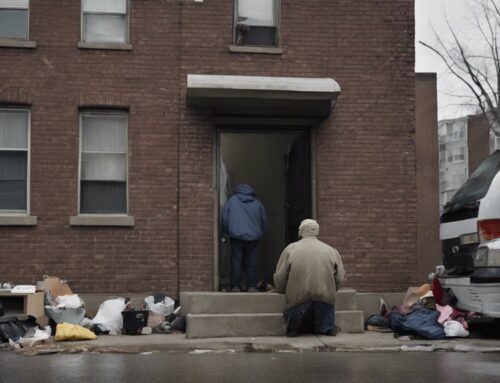Locks are the guardians of your property, but their changing can raise significant legal questions in Illinois. You'll need to understand your responsibilities as a landlord, especially when a tenant vacates or requests a lock change due to safety concerns. What happens if there's an emergency that requires immediate access? Knowing the ins and outs of legal compliance, timelines, and quality standards can make all the difference in preventing potential liability. You'll want to explore how these guidelines not only protect you but also enhance tenant safety.
Key Takeaways
- Landlords must promptly change or rekey locks when a tenant vacates to ensure security and comply with legal obligations.
- Tenants can request immediate lock changes due to domestic violence threats, requiring written notice and evidence to landlords.
- Landlords must respond to lock change requests within 48 hours, providing new locks of equal or better quality.
- Locks can only be changed post-eviction after the sheriff enforces the eviction order, maintaining compliance during the notice period.
- Compliance with legal guidelines on lock changes fosters trust between landlords and tenants and enhances overall property security.
Lock Changes After Tenants Vacate

When a tenant vacates a rental unit, it's essential for landlords to promptly change or rekey the locks to guarantee security for new occupants. Illinois law mandates this procedure particularly in counties with populations exceeding 3 million, like Cook County. Additionally, landlords should be aware that failure to change locks can lead to legal issues that compromise tenant safety. This includes the risk of fraudulent lock access which can severely impact both tenants and landlords.
If landlords neglect to change the locks, they may face legal liability for any theft or damage that occurs due to unauthorized access. To comply, schedule a walk-through with the departing tenant to collect keys and inspect the unit. Even if all keys are returned, changing the locks remains crucial to prevent potential unauthorized entry.
It's important to complete the lock change before a new tenant moves in, ensuring they feel secure in their new home. In specific scenarios like lease expirations, abandonment, or eviction, the procedure for changing locks may differ. For example, landlords can change locks when a unit is deemed abandoned after a tenant moves their belongings out and fails to pay rent for 21 days.
In instances of eviction, follow the required legal protocol, including serving notices and possibly facing appeals, before attempting to change the locks. Additionally, in Cook County, where lock change laws are mandated, landlords must adhere to these regulations to ensure compliance.
Tenant-initiated lock changes are permissible only under specific lease conditions. Tenants must notify landlords and provide a copy of any new key if they do change locks. Clear communication and understanding between landlords and tenants regarding lock change policies help to maintain security and prevent disputes.
Domestic Violence Lock Change Requests

Domestic violence can create urgent situations where a tenant feels unsafe in their home, prompting the need for immediate action regarding lock changes. If you find yourself in this situation, you need to know your rights under Illinois law, which allows tenants to request an immediate lock change due to credible and imminent threats of domestic or sexual violence.
To initiate this process, you must submit a written request to your landlord, with all tenants on the lease included—excluding the abuser if they're on the lease. Along with your request, you must provide documentation proving the threat, which can include police reports, medical records, or statements from victim services organizations. In such cases, it's also crucial to understand the role of a locksmith during evictions, as they are often involved in ensuring the safety of distressed tenants. Lock changes performed by a locksmith in these instances aim to provide a secure environment for those affected by domestic violence.
If the abuser is listed on the lease, a plenary order of protection or a civil no-contact order granting you exclusive possession is essential. Additionally, the law encourages collaboration between housing providers and community organizations to better support survivors in these situations.
Your landlord is required to change the locks or allow you to do so within 48 hours of receiving your request. If they fail to comply, you can change the locks without permission and potentially take legal action against them. The landlord must also work with you in good faith to exchange new keys.
Moreover, your personal information regarding this situation must remain confidential, as violations can incur fines.
Importantly, if you assert your rights following the Safe Homes Act, you won't face penalties, such as being responsible for next month's rent, should you decide to terminate your lease early.
Tenant-initiated Lock Changes
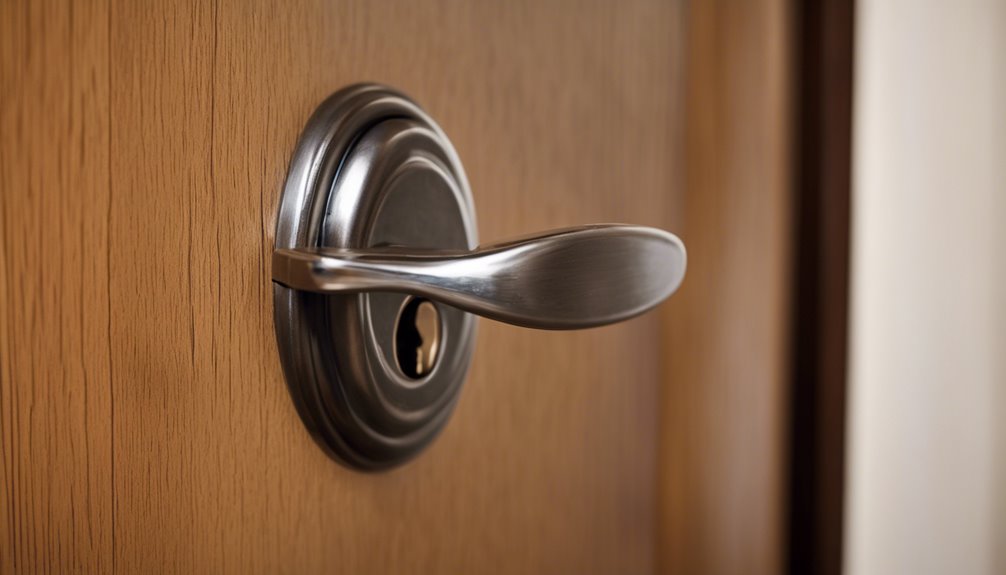
As a tenant, you have specific rights regarding lock changes, which are often outlined in your lease agreement. If you're permitted to change the locks, it's essential to follow the established procedures, including notifying your landlord and providing a copy of the new keys. Additionally, be aware that after your move-out, your landlord is legally required to change the locks to ensure tenant security for new residents. Moreover, tenants in Illinois should understand that the legality of lock picking varies, and acquiring skills in this area should be approached with caution. Furthermore, tenants should also be aware of key duplication laws to ensure that any keys made are legally compliant. Adhering to these guidelines helps guarantee that you avoid potential legal issues while maintaining access rights for both you and your landlord.
Tenant Rights Overview
Tenants facing imminent threats of domestic or sexual violence have the right to initiate lock changes under specific conditions outlined by Illinois law. You can request lock changes if you or a household member faces credible threats.
First, you must provide written notice to your landlord, signed by all tenants on the lease. This notice must include evidence, such as medical reports, court orders, police documentation, or a statement from a domestic violence organization. If the threat comes from a co-tenant, you'll need a plenary order of protection or a civil no contact order granting exclusive possession. Additionally, please remember that locksmith services should ensure ADA compliance to accommodate all individuals needing assistance during this process.
Your landlord is obligated to change the locks or grant you permission to do so within 48 hours of receiving the notice. If they fail to comply within that timeframe, you have the right to change the locks without permission and must make a good faith effort to provide a key to the new locks.
Confirm the new locks are of equal or better quality and installed in a workmanlike manner. It's essential to keep in mind that landlords aren't liable for damages arising from the changed locks when the correct legal procedure is followed. Remember that for more comprehensive security, it's advisable to consult a licensed locksmith in Illinois to ensure all changes are properly executed.
Lock Change Procedure
Lock Change Procedure (Tenant-initiated Lock Changes)
Understanding the lock change procedure is essential when facing threats of domestic or sexual violence. As a tenant, you must provide written notice to your landlord, detailing the need for the lock change due to a credible imminent threat. This notice should come from all tenants on the lease. You also need to present evidence of the threat or a relevant court order. It's important to ensure that the new locks comply with essential lock safety standards to maintain security and compliance.
Here's a quick overview of the lock change procedure:
| Step | Action Required | Timeframe |
|---|---|---|
| Written Notice | Submit notice to the landlord | Immediately |
| Evidence Submission | Provide required documentation | Within notice submission |
| Lock Change | Landlord must change locks or permit tenant access | Within 48 hours |
If the landlord fails to change the locks, you have the right to do it yourself. However, verify that the new locks are of equal or better quality. Remember, you need to provide a key to the landlord to maintain emergency access. Following these steps protects you while confirming compliance with Illinois law, and it's crucial to avoid unauthorized locksmithing practices that could lead to legal repercussions.
Key Provision Requirements
Key provision requirements for tenant-initiated lock changes aim to guarantee safety in situations involving domestic or sexual violence. Under Illinois law, you must provide written notice to your landlord if you're changing the locks due to such threats. This notice should be accompanied by evidence of the violence—a medical report, court document, police report, or record from a victim services organization.
If the threat is from someone who isn't a lessee, make sure your evidence aligns with the claim. Should the threat involve a lessee, you'll need to present a plenary order of protection or a plenary civil no-contact order. Importantly, you don't need permission from the person posing the threat if you've secured the necessary orders.
Once your landlord receives the evidence, they've 48 hours to either change the locks or grant permission for you to do so. If they fail to comply, you can change the locks yourself.
Eviction Process and Lock Changes
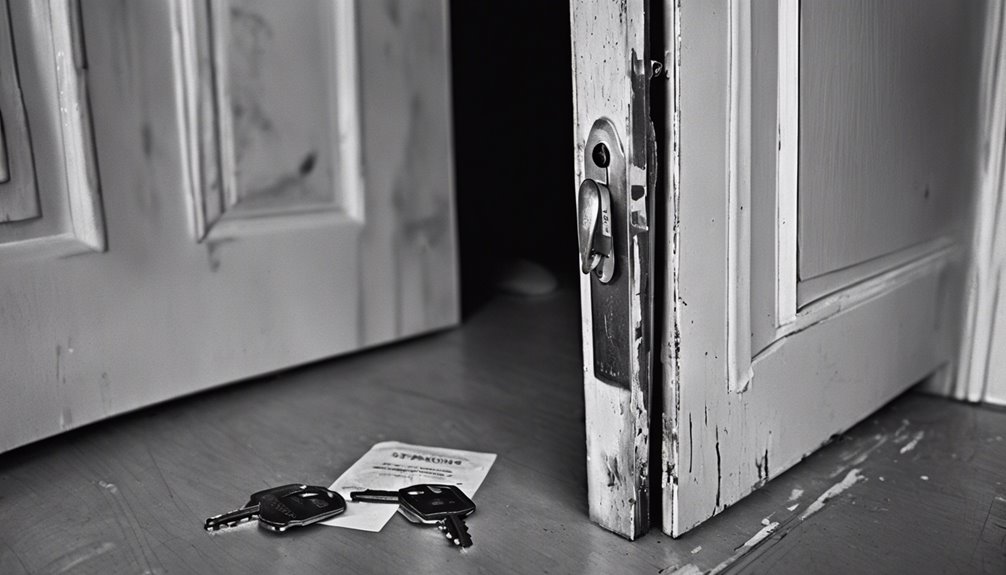
Steering through the eviction process in Illinois involves specific protocols regarding lock changes that both landlords and tenants must adhere to carefully.
Initially, the process starts with a notice period, typically a 5- to 10-day notice for the tenant to remedy specific violations. You'll find notices vary based on the issue—rent demands or lease violations. During this notice period, it's vital for both parties to respect existing lock arrangements; landlords can't change locks until the entire eviction process is legally completed and sanctioned by the court.
If the tenant doesn't comply with the notice, you, as the landlord, can file an eviction lawsuit. A court hearing will follow, during which both parties present their case. Even after receiving a judgment in your favor, you can't change the locks immediately; instead, you must wait for the sheriff to officially enforce the eviction order.
Once the sheriff carries out the eviction, the tenant typically receives 7 to 14 days to vacate. It's important during this timeframe to maintain emergency access to the rental unit.
After the tenant has moved out, you're permitted to change the locks to secure the property. Verify that when changing locks, you comply with Illinois laws, using locks equivalent to or better than the originals, and keep thorough documentation of these changes for your records.
Proper management of locks post-eviction is essential to prevent potential liabilities and verify compliance.
Exemptions From Lock Change Requirements

In Illinois, certain exemptions apply to lock change requirements based on property type and occupancy status.
For instance, if you occupy one of the units in a multi-family residence with four or fewer units, you're exempt from these rules.
However, this exemption doesn't extend to shared housing situations where tenants rent individual bedrooms.
Owner-Occupied Units Exemption
When you occupy one of the units in a residential building with four or fewer apartments, you're typically exempt from the lock change requirements established by the Illinois Landlord Tenant Act. This exemption is dependent on your occupancy; as the owner residing in one of the units, you're not subject to the lock change mandates that apply to properties with more than four units.
It's important to understand that if your building exceeds this limit, the exemption no longer applies.
Furthermore, this law is targeted specifically at Cook County, where populations exceed three million. In contrast, smaller counties in Illinois are free from these particular lock change regulations, reflecting the difference between urban and rural dynamics.
Additionally, if you rent out rooms in your private home while you occupy the same residence, you're likewise exempt from fulfilling lock change requirements between tenants.
This reflects a recognition of personal space and landlord-tenant relationships in intimate living arrangements. By understanding these exemptions, you can navigate your responsibilities more effectively while fostering a respectful, safe living environment for all parties involved.
While many regulations govern lock changes in rental properties, shared housing arrangements stand apart with specific exemptions. If you're renting a room in a private home, you won't need to worry about lock changes; your landlord is exempt from this requirement regardless of the lease type. This exemption applies universally, without specific population or county restrictions, as it focuses on the type of housing rather than the lease.
In the case of multi-family units, such as apartment buildings with four units or fewer, exemptions might also apply, particularly if the owner occupies one of the units. However, if it's not owner-occupied, lock change requirements may not apply in shared housing contexts.
It's important to note that counties with populations over three million have different regulations. In these areas, lock change requirements become mandatory.
But shared housing arrangements in counties below this threshold are free from strict lock change laws. This distinction helps balance security concerns with the practical needs of shared living, allowing you greater freedom in your rental experience.
Emergency Access Requirements
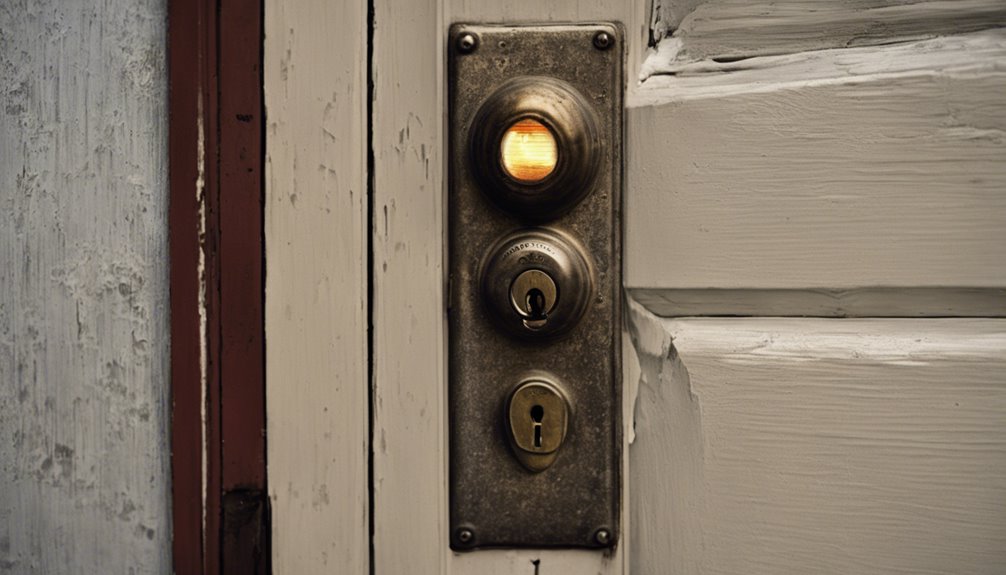
Emergency access requirements allow landlords to enter rental properties without tenant permission during urgent situations, guaranteeing safety and prompt resolution of threats. In critical circumstances, such as fire, flooding, or other emergencies, landlords can access your unit immediately and without prior notice. However, it's crucial that this entry is conducted in a peaceable manner and without force.
Within two days of entering, your landlord must notify you of the entry. This notification can be delivered through several means—mail, telephone, or written notice to your dwelling unit. This requirement guarantees that you remain informed of the entry and any actions taken during the emergency.
Typically, landlords need to respect reasonable hours for entries, which are generally defined as between 8:00 AM and 8:00 PM. During emergencies, however, they've the flexibility to enter at any time.
If you ever feel that your landlord is accessing your unit unlawfully, it's crucial to know your rights. Unlawful entry or repeated unreasonable demands can lead to penalties under the Chicago Residential Landlord Tenant Ordinance (CRLTO). You may obtain an injunction against your landlord, terminate the rental agreement, or recover damages and attorney fees if your rights are violated.
Understanding these emergency access requirements can help protect your rights and guarantee that urgent matters are handled effectively and transparently.
Lock Quality Regulations
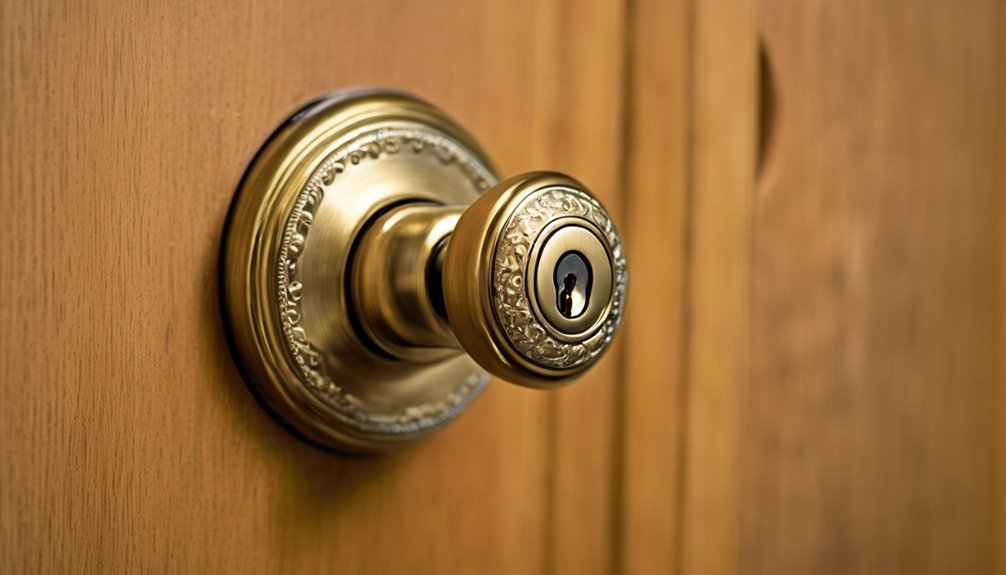
Lock quality regulations in Illinois are vital for guaranteeing the safety and security of rental properties. As a landlord, you must install deadbolt locks on every entry point of a rental unit. Moreover, the locks need to be secured with three-inch screws for the strike plates on all unit entry doors, enhancing their strength against unauthorized access.
For sliding doors and windows located on the first floor, garden levels, and easily accessible second floors, implementing antilift slide devices is mandatory.
Additionally, you should verify that your property features adequate security lighting, illuminating hallways, entryways, parking lots, and common areas to deter potential threats. Eye views, which provide a 180-degree perspective, must be installed on all entry doors to enhance visibility and safety.
When it comes to lock change obligations, remember that you're legally required to change or rekey locks upon a tenant's departure if a new tenant enters into a written lease agreement. Failing to do so could render you liable for any theft-related damages.
It's also important to be aware of exemptions, especially regarding smaller apartment buildings or rented rooms in private homes occupied by the owner.
Furthermore, locks and security measures should form part of a thorough security plan, which includes proper maintenance of outdoor spaces to eliminate hiding spots.
Compliance with these regulations not only secures your property but also establishes trust with future tenants.
Frequently Asked Questions
Can Tenants Change Locks Without Informing the Landlord?
Imagine you're sailing your own ship; the sea represents your rented space.
Just as you must navigate with respect to maritime laws, you need to follow lease terms regarding locks. Changing locks without telling your landlord can feel liberating, but it might lead to stormy waters, risk disputes, or eviction.
It's crucial to know you're likely required to ask first and share a key, ensuring smooth sailing in your rental journey.
What Evidence Is Needed for Domestic Violence Lock Change Requests?
To request a lock change due to domestic violence, you need to gather specific evidence.
This includes a written request to your landlord and documentation like police reports, medical statements, or notes from victim services.
If the abuser is on the lease, guarantee you have a court order granting exclusive possession.
You must submit this evidence within the required timeframe, maintaining confidentiality throughout the process to protect your rights and safety.
How Can a Tenant Request a Lock Change Due to Safety?
To request a lock change due to safety concerns, you need to submit a written notice to your landlord.
This notice should include all tenants involved if the threat comes from outside your unit.
Be sure to provide supporting evidence, like police reports or medical documentation, to back up your claim.
What Constitutes a Valid Eviction Notice in Illinois?
Imagine planting a seed: for it to grow, you must nurture it correctly.
Similarly, a valid eviction notice in Illinois requires precise details. You must provide a written notice stating the reason for eviction and specify the timeframe for compliance.
Deliver it properly—hand delivery, to a resident, or via certified mail. Guarantee it aligns with lease terms and keep documentation.
This structured approach safeguards your rights and fosters clarity in the eviction process.
Are There Penalties for Landlords Who Fail to Change Locks?
Yes, there are penalties for landlords who fail to change locks.
If you're a landlord and don't comply, you could be held liable for any damages caused by theft. Tenants have the right to seek compensation for losses resulting from your neglect.
Additionally, non-compliance may lead to legal action, fines, and financial penalties, impacting your relationship with tenants and potentially complicating future eviction processes.
It's crucial to adhere to these responsibilities.
Conclusion
In conclusion, understanding Illinois lock change regulations is essential for both landlords and tenants. By adhering to these guidelines, you not only guarantee compliance but also enhance safety and security in rental properties. With timely lock changes, can you afford to overlook the safety of your next tenant? Remember, taking proactive measures can protect all parties involved and prevent potential legal issues down the line. Stay informed to foster a secure living environment.



